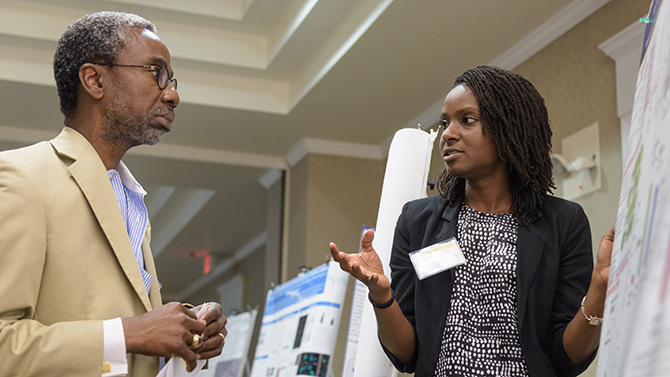


Biomedical symposium
Photo by Evan Krape June 29, 2016
Event promotes collaboration through sharing of research highlights
In 2011, biomedical engineering at the University of Delaware was a fledgling undergraduate program with a handful of faculty from various departments teaching classes and conducting research. To spur collaborations, the program’s new director, Dawn Elliott, organized a research symposium where affiliated faculty could share brief highlights of their work.
Fast forward five years. Biomedical engineering at UD is now an ABET-accredited department with 17 primary and joint faculty and another 45 affiliates, a doctoral degree program, and a U.S. News and World Report ranking in the upper 50 percent of programs across the country.
Elliott decided it was time for a reprise of the “speed-dating-format” research symposium.
On Monday, June 20, more than 100 researchers, including graduate students, faculty and external professionals came together for the event, which was held at the Embassy Suites.
The program included 36 five-minute talks by UD faculty and external professionals addressing several research areas: musculoskeletal engineering, neural engineering, tissue and regenerative engineering, cancer diagnosis and therapy, and disease modeling.
“Our goal is to give a flavor of what everyone is doing so people can seek each other out at lunch and during breaks to continue the conversation,” Elliott said. “We have a lot of new young faculty, and this is a great opportunity for them to share what they’re doing and learn about what their colleagues are doing.”
Presenters shared not only the highlights and impact of their research, but also described what they can bring to the research arena and what they could use from others to augment their work.
For assistant professor Megan Killian, the symposium was “a great way to reflect on the biomedical research going on across campus and even the region.”
“It was particularly valuable for me because there were several talks describing resources, tools and models that are complementary to my lab’s research,” she says. “The symposium was like a collaborative kick-starter. The timing and networking opportunities couldn’t have been better.
Sarah Rooney, assistant professor of instruction, attended the symposium so that she could “learn about the diverse research done by UD BME faculty and collaborators and brainstorm ways to bring these research applications into the classroom.”
“Our undergraduate students thrive when they are introduced to tangible applications of course content,” she says. “As an educator, it is also critical that I stay up-to-date with the cutting-edge advances made in our field, so I can articulate these advances to the students, and there are few better places to learn about these advances than on a vibrant research campus like UD.”
The symposium was sponsored by the Department of Biomedical Engineering, Delaware INBRE and Delaware CTR-Accel.
Contact Us
Have a UDaily story idea?
Contact us at ocm@udel.edu
Members of the press
Contact us at 302-831-NEWS or visit the Media Relations website

